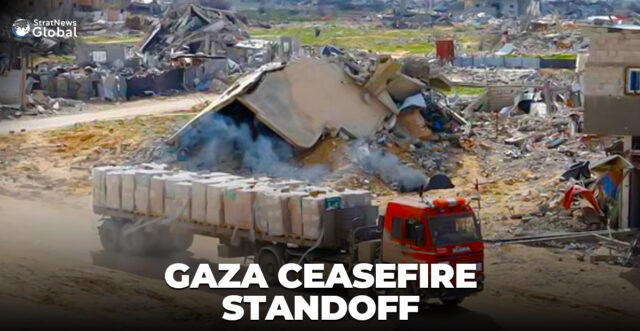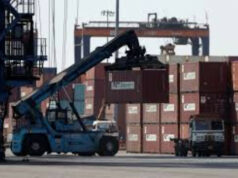Israel blocked trucks carrying humanitarian aid from entering Gaza on Sunday as the truce standoff escalated, halting six weeks of calm, while Palestinian militant group Hamas urged Egyptian and Qatari mediators to intervene.
Israeli Prime Minister Benjamin Netanyahu‘s office said earlier that it had adopted a proposal by U.S. President Donald Trump’s envoy, Steve Witkoff, for a temporary ceasefire in Gaza for the Ramadan and Passover periods, hours after the first phase of the previously agreed ceasefire expired.
If agreed, the truce would halt fighting until the end of the Ramadan fasting period around March 31 and the Jewish Passover holiday around April 20.
Conditional Ceasefire
The truce would be conditional on Hamas releasing half of the living and dead hostages on the first day, with the remainder released at the conclusion, if an agreement is reached on a permanent ceasefire.
Hamas says it is committed to the originally agreed ceasefire that had been scheduled to move into a second phase, with negotiations aimed at a permanent end to the war, and it has rejected the idea of a temporary extension to the 42-day truce.
A senior Hamas official, Mahmoud Mardawi, told Al Jazeera the group would only release the remaining Israeli hostages under the terms of the already agreed-upon phased deal.
Reflecting the fragility of the ceasefire deal, local health officials said Israeli gunfire had killed four Palestinians in separate attacks in the northern and southern Gaza Strip.
The Israeli military said that “suspects” were identified close to its troops in northern Gaza and that they had planted a bomb. It added that an airstrike was carried out to “eliminate the threat.”
Ceasefire Dispute
Egyptian sources said on Friday that the Israeli delegation in Cairo had sought to extend the first phase by 42 days, while Hamas wanted to move to the second phase of the ceasefire deal. Spokesman Hazem Qassem said on Saturday that the group rejected Israel’s “formulation” of extending the first phase.
In the first phase of the ceasefire, Hamas handed over 33 Israeli hostages as well as five Thais returned in an unscheduled release, in exchange for around 2,000 Palestinian prisoners and detainees from Israeli jails and the withdrawal of Israeli troops from some of their positions in Gaza.
Second Phase
Under the original agreement, the second phase was intended to see the start of negotiations over the release of the remaining 59 hostages, the full withdrawal of Israeli troops from Gaza, and a final end to the war.
However, the talks never began and Israel says all its hostages must be returned for fighting to stop.
“Israel will not allow a truce without the release of our hostages,” Netanyahu’s office said, announcing that the entry of all goods and supplies as well as humanitarian aid into the Gaza Strip would be halted.
“If Hamas persists in its refusal, there will be additional consequences.”
Hamas has denounced Israel’s move as “blackmail” and a “blatant coup against the agreement”.
“We call on mediators to pressure the occupation to fulfil its obligations under the agreement, in all its phases,” it said, adding that the only way to get the hostages back would be to adhere to the agreement and start talks for the second phase.
Commenting on the goods suspension, senior Hamas official Sami Abu Zuhri told Reuters the decision would impact the ceasefire talks, adding his group “doesn’t respond to pressures.”
Later on Sunday, Israeli officials said a delegation would arrive in Cairo in an apparent move to discuss ways to defuse tensions and ensure the ceasefire remains in effect.
Standoff
Speaking at a news conference with his Croatian counterpart, Israel’s Foreign Minister Gideon Saar said Palestinians in Gaza would not get goods for free and further negotiations should be linked to the release of the hostages.
He said the United States “understands” Israel’s decision to halt the entry of goods into Gaza, blaming Hamas for the current stalemate in the talks.
Ceasefire Breaches
Over the past six weeks, both sides have accused the other of breaching the agreement. But despite repeated hiccups, it has remained in place while the hostage-for-prisoner exchange envisaged in the first phase was completed.
However, there are wide gaps in key areas regarding a permanent end to the war, including what form a postwar administration of Gaza would take and what future there would be for Hamas, which triggered Israel’s invasion of Gaza with its attack on southern Israel on October 7, 2023.
The attack killed 1,200 people, in the worst one-day loss of life in Israel’s history, and saw 251 people taken into Gaza as hostages. The Israeli campaign has killed more than 48,000 Palestinians, displaced almost all of its 2.3 million population and left Gaza a wasteland.
(With inputs from Reuters)





